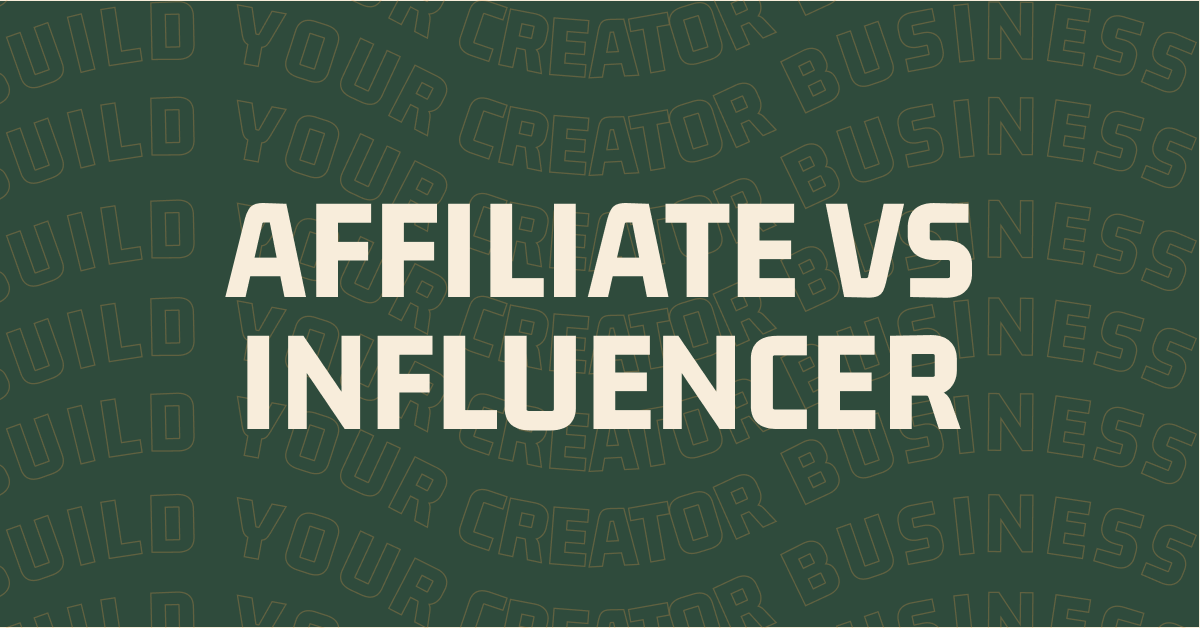Influencer Marketing VS Affiliate Marketing, End of An Era?
Spoiler: affiliate marketing is not dying. It's still here. What's changing is how we build audiences, and how trust is distributed as a result.

Remember when making money online meant plastering your blog with affiliate links and praying for clicks? Well, times have changed, my friend.
Just like they changed before that. Before my time, much to my chagrin, the game used to be paid advertising. Back in a time when search and display ads cost only a three winks and a handshake, and anybody would click anything on the internet because everything was a novelty.
In fact, the first (online) affiliate program was started by a company called PC Flowers & Gifts in 1 9 8 9. Can you believe that? Maybe, but I was shocked.
But affiliate marketing is really just another term for referral marketing, and that's been around since trade and commerce first began. There's nothing new about offering a commission to a trusted partner who sends business your way.
This ancient method for go-getters to earn an income feels like it's been dying, a bit, lately. Or at least, in comparison to the new hotness which is influencer marketing.
But it's not dying. It's still here. What's changing is how we build audiences online, and how trust is distributed.
The Old School: Traditional Affiliate Marketing
Back in the day, affiliate marketing was pretty straightforward. You'd sign up for an affiliate program, slap some links on your website, and hope people clicked and bought stuff. The big players like Amazon Associates ruled the roost, and commissions were the name of the game.
Here's how it typically works:
- You'd join an affiliate program (Amazon was the go-to for many)
- Get your unique referral links
- Add those links to your blog posts or website
- Wait for people to click and make purchases
- Earn a commission on each sale (usually around 5-10% for physical products, 20-30% for software, and up to 70% for info products like courses)
Sounds simple, right? Well, it was... until it wasn't.
The pros of this model were clear: low barrier to entry, potential for passive income, and the ability to monetize almost any niche. But there were some significant downsides:
- Reliance on high traffic volumes
- Low conversion rates (often less than 1%)
- Constant need to create new content to stay relevant
- Vulnerability to algorithm changes and program shutdowns
"The affiliate thing really doesn't work when you build a good sized audience." - Richard, on episode 12
As Richard points out, this model has limitations, especially as your audience grows. It's time for a more sophisticated approach.
The New Kid on the Block: Rise of Influencer Marketing
Enter the era of influencer marketing. This shift changed the game entirely, moving from anonymous referral links to personal brand power. Suddenly, it wasn't just about what you were promoting, but who you were.
Key differences between affiliate marketing and influencer marketing:
- Personal brand focus: Your identity and reputation become central to your marketing efforts.
- Platform diversity: Instead of relying solely on websites, creators now leverage social media platforms like Instagram, YouTube, and TikTok.
- Content type: Shift from text-heavy blog posts to visual content like photos, videos, and stories.
- Engagement metrics: Success is measured not just in sales, but in likes, comments, and shares.
- Compensation models: Move from pure commission to flat fees, sponsored content, and long-term partnerships.
This new model brought its own set of advantages:
- Higher engagement rates
- More creative freedom
- Potential for higher earnings
- Opportunity to build a loyal community
But it's not without challenges:
- Pressure to maintain a consistent online presence
- Need for high-quality content creation skills
- Balancing authenticity with brand partnerships
- Navigating the complexities of disclosure and transparency
"By 2026, over 30% of consumers are predicted to prefer brands with sustainable and ethical affiliate partnerships."
This statistic highlights the growing importance of authenticity and values alignment in influencer partnerships. It's not just about promoting products anymore; it's about building trust with your audience.
The Hybrid Approach: Where Affiliate Meets Influence
Now, we're seeing a blend of traditional affiliate marketing and influencer strategies. And to be honest, this feels to me like the best of both for both brands and creator.
It allows creators to leverage their personal brand while still benefiting from performance-based earnings.
Here's what this might look like in practice:
- Content creation: Produce engaging content featuring products or services
- Personal endorsement: Share your genuine experience and thoughts
- Trackable links: Include affiliate links or custom discount codes
- Multi-platform promotion: Share across your website, social media, and email list
- Long-term partnerships: Build ongoing relationships with brands you love
This approach allows for more flexibility in compensation models:
- Flat fees for content creation
- Commission on sales through your links
- Performance bonuses for hitting certain targets
- Product gifting or experiences
"So they know that it's not the number of clicks or this, that or the other. It's literally, hey, we're going to work with you and your word carries a great deal of weight in the industry." - Richard, on episode 12
Richard's insight shows how brands are valuing creators beyond just clicks and sales. Your influence and reputation in your niche become valuable assets.
Navigating the New Landscape as an Aspiring Creator
So, how can you, as an aspiring creator with a day job, make the most of this evolving landscape? Here are some practical steps:
- Choose your niche: Focus on an area you're passionate about and knowledgeable in.
- Build your personal brand: Start creating content that showcases your expertise and personality.
- Engage with your audience: Respond to comments, ask questions, and build a community.
- Start small: Don't wait for a massive following to begin partnerships.
- Be authentic: Only promote products or services you genuinely believe in.
Try This: Crafting Your First Brand Pitch
Ready to take action? Here's a simple exercise to get you started:
- Identify a brand you love and use regularly
- Write down 3-5 reasons why you genuinely enjoy their product
- Brainstorm 2-3 creative ways you could promote this brand to your audience
- Draft a short email pitch (150 words max) introducing yourself and your idea
- Share your draft with a friend for feedback before sending
Remember, your first pitch doesn't need to be perfect. The goal is to start building those relationships and gain experience.
The Future of Creator-Brand Relationships
As we look ahead, several trends are shaping the future of creator-brand partnerships:
- Micro and nano-influencers: Brands are increasingly valuing smaller, highly engaged audiences.
- Long-term ambassadorships: Moving away from one-off sponsorships to ongoing relationships.
- Co-creation opportunities: Creators getting involved in product development and brand strategy.
- Increased focus on ROI: More sophisticated tracking and performance metrics.
- Emphasis on authenticity: Consumers demanding genuine, transparent partnerships.
What way will you go, traveler?
While the old model of plastering links across your blog might not cut it anymore, the opportunities for creators have never been more exciting or diverse.
As an aspiring creator, you're entering this space at a time of immense possibility. Creators have never had more power over their own future, to cut deals, build loyal audiences, and own the web. The key is to focus on building genuine connections with your audience, staying true to your values, and being open to evolving alongside the industry.
Remember, the most successful creators aren't just salespeople; they're trusted advisors, entertainers, and community builders. By embracing this role and adapting to the changing landscape, you can turn your passion into a thriving creator business.
So, are you ready to take the leap from passive link-dropper to influential creator? The future of affiliate marketing is waiting for you to shape it

